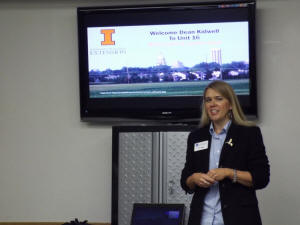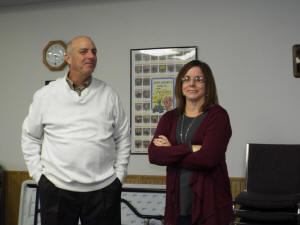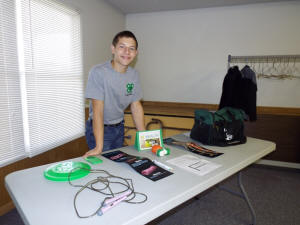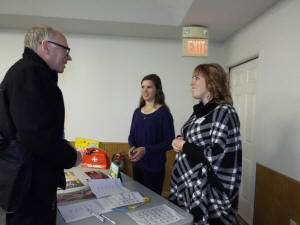|
University of Illinois College of
ACES Dean Dr. Kim Kidwell visits Logan County
 Send a link to a friend
Send a link to a friend
 [November 08, 2017] [November 08, 2017]
LINCOLN
On
Friday of last week, University of Illinois Extension Unit 16, which
includes Logan, Menard, and Sangamon Counties was visited by U of I
College of Aces Dean Dr. Kim Kidwell.
The day began in Lincoln at the extension office, then moved on
to Washington-Monroe School for a session of Ag in the
Classroom, and Lincoln College’s Dr. G. Dennis Campbell
Creekside Environmental Education Center. The tour accomplished
all this by noon, then moved on to visit the other counties in
the unit.
Also in attendance Friday morning were U of I Associate Dean and
Director of Extension, George Czapar, several U of I
administrators, local Extension staff, volunteers, local
officials who work with and/or partner with the Extension, and
selected 4-H members.
At the Extension office in Lincoln, Unit 16 Director Terri
Miller offered a brief PowerPoint presentation defining the work
going on within the unit area.

Unit 16 Director
Terri Miller
Miller opened saying that as the director of Unit 16, she was
now celebrating four months on the job. She said she was still
in the learning-mode about her unit, and she commended the staff
in her offices, saying that they were fantastic.
She defined Unit 16 as being where town and country meet. She
talked about the different counties, and the inclusion of the
metro area of Springfield within the unit, as well as many small
communities and rural areas.


Logan County
Staff Member Amy Hyde visits with a guest.

As does staff
member Patty Huffer
In the mix, the main office is in Sangamon County, with the
Lincoln and Petersburg offices being branches. In population,
Sangamon County is the largest, with a population of about
200,000. Logan comes in second with a population of
approximately 30,000 people and Menard County’s population is
roughly 12,000. She said the communities were all very
different, with many different needs.
The goal of the extension is to extend knowledge to change
lives. She said that the extension helps people to solve
problems, develop skills, and build a better future.
Miller talked briefly about some of the extension programs such
as Master Gardeners, the 4-H Teen Teachers and Ambassador
Programs, as well as the SNAP-ED Smarter Lunch Room programs.
Determined to keep the day on schedule, Miller wrapped up
quickly, then invited all in the room to spend a few minutes at
the 4-H Challenge tables set up on the perimeter of the room.
She asked Carissa Akpore to introduce the program.
Akpore explained that this summer the 4-H program did some
community service, leading the Human Body Detectives project.
She said that the tables the guests would visit were examples of
the program, and drew attention to the four H’s in 4-H - Head,
Hands, Heart, Health. She said that the program was a learning
without being directly taught, in that participants have to use
their detective skills to solve the challenges.
[to top of second column] |


Molly Schempp

Cavit Schempp


Ruthie Ruhl
(left)

Dr. Kidwell
visits Molly Schempp's station

Cavit Schempp
explains the items at his station

Ruthie Ruhl and
Carissa Akpore visit with a guest a Ruhl's station
Three of the four tables were manned by 4-H members Molly
Schempp, Cavit Schempp and Ruthie Ruhl. The 4-H’ers explained
their station and encouraged visitors to participate in the
challenges.

Soon it was time to move on to the Ag in the Classroom program,
and guests departed for the next stop.
Before leaving the Lincoln office Dr. Kidwell took time to talk
about the objective of the tour of Unit 16. She said that she
has set a goal of visiting all 28 extension units in the state.
As the Dean of the College of Aces she hears from the various
units about what they are doing, but she felt it would be of
value to see firsthand the work of the people serving the
community through the U of I Extension.
“I want to get a feel for what is really happening. Instead of
just sitting in Champaign and hearing about it, I’m coming out
to see it, and get their feedback on what we are doing that is
working well, what they value and appreciate about us, and
opportunities for us to expand,” Dr. Kidwell said.
[Nila Smith] |